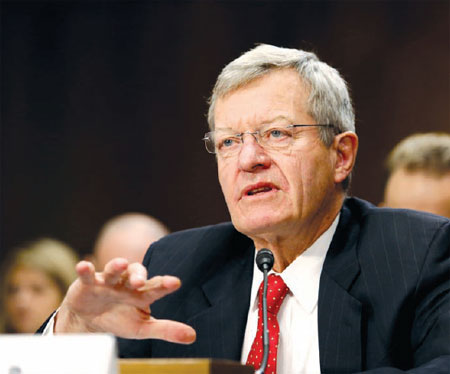Baucus says he'll guide China ties
|
Max Baucus, who was nominated by US President Barack Obama as the country's ambassador to China to replace Gary Locke, testifies before the Senate Foreign Relations Committee on Tuesday. Sun Chenbei / China Daily |
Max Baucus, who has been nominated by President Barack Obama as US ambassador to China, vowed to strengthen bilateral ties during his testimony before the Senate Foreign Relations Committee on Tuesday.
Baucus, a long-time Democrat Senator from Montana, told his colleagues that the US-China relationship is one of the most important bilateral relationships in the world.
"It will shape global affairs for generations to come. We must get it right," said the 72-year-old.
Baucus, who was chairman of the powerful Senate Committee on Finance, emphasized the importance of trade relations with China.
"From my first official visit to China in 1993 to my most recent trip in 2010, I have worked through economic diplomacy to strengthen ties between the United States and China," he said. "I look forward to continuing that work to build a stronger, more equitable economic relationship between our countries."
Baucus said if confirmed, he would want to accomplish two over-arching goals that are critical to US relationship with China and can help achieve shared interest in a safer, more prosperous world.
The goals, according to Baucus, are to develop the economic relationship with China in a way that benefits American business and workers; and to partner with China as it emerges as a global power and encourage it to act responsibly in resolving international disputes, respecting human rights and protecting the environment.
He recalled his visit to China in 2010 when he met Chinese President Xi Jinping, then vice-president. Baucus said leaders from both sides have recognized that the two countries have much more to gain from cooperation than from conflict.
"I believe that as well, and I see many areas of our relationship where cooperation is not only possible, but vital," he said.
Baucus believes engagement with China will allow the two nations to identify shared goals. "It will allow us to achieve concrete results," he said.
According to Baucus, bilateral cooperation is also critical on geopolitical issues, such as the Democratic People's Republic of Korea's nuclear program, territorial disputes in South and East China Seas, Taiwan, as well as cyber security, climate change, human rights and freedom.
"If confirmed, I will strive to strengthen the US-China relationship for the benefit of our two countries and the world," he said.
Baucus' hearing before his Senate colleagues was conducted in a generally friendly mood, except a few questions from Republican Senators.
"I am sure you will be confirmed," said Senator Robert Menendez, a Democrat from New Jersey and chairman of the Foreign Relations Committee. All signs show that Baucus confirmation is set to be approved as early as next Tuesday.
Cheng Li, a senior fellow at the Brookings Institute, said the selection of Baucus is a very good one. In Li's view, Baucus is a heavyweight and holds good relationship with both President Obama and Vice-President Joe Biden, both of whom served in the Senate.
While Baucus' comment that he is "no real expert on China" caught the attention of the news media and some in the Senate, Li, who had a good conversation with Baucus not long ago, said Baucus is good at learning and listening.
"This is more precious than what he knew before, or even if he was an expert on China," Li said.
For Li, China has been changing rapidly and even many experts on China need to constantly learn about China.
Li believes regional security, financial reform, American values and a host of cooperation in environmental protection, public health and food safety will be the key areas for Baucus once arriving in Beijing.
He noted that Baucus' expertise in finance will enable him to offer a helping hand in China's economic and financial reform.
Douglas Paal, vice-president for studies at the Carnegie Endowment for International Peace, called Baucus "Senator Trade". Baucus' staff members have populated the US Trade Representative and WTO offices in Geneva.
"So I assume his preference will be to promote economic relations, the Bilateral Investment Treaty, and other trade-related arrangements," Paal said.
"But the dominant feature of US-China relations is increasingly strategic competition and how to manage it, and that will impinge on his priorities," he said.
Orville Schell, director of the Center on US-China Relations, said while the US and China have managed to build up a solid foundational system of bilateral cooperation, this critical relationship is nonetheless still beset by myriad dangerous points of tension.
He believes if confirmed, Baucus will confront a number of potentially destabilizing disagreements which threaten to undermine the immediate ability for the two countries to work together jointly on other issues.
chenweihua@chinadailyusa.com



















